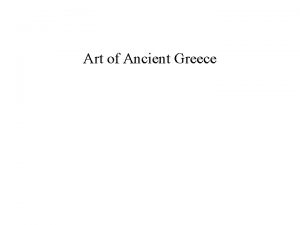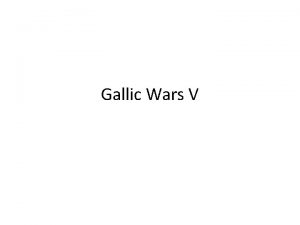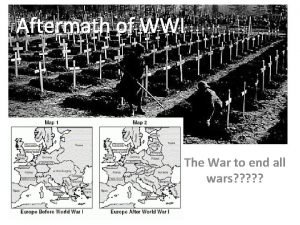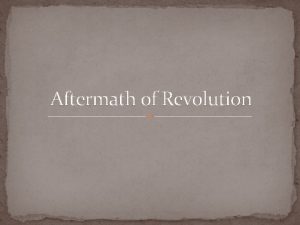Aftermath of the Gallic Wars What happened to













- Slides: 13

Aftermath of the Gallic Wars What happened to Gaul after the Gallic Wars ended and what happened to the people living there?


A Few Things to Explain • There were many revolts by the people of Gaul during the later half of the Gallic Wars. My topic will be covering what happened to the individual tribes of people. Some of them were defeated before these revolts and others were defeated during the revolts. Some even disappeared and returned a few times. • The punishments that Caesar dealt out were dependent on his mood. If he was in a forgiving mood, they were to rebuild their cities in the name of Rome. If he was angry, he would often kill off entire amounts of their population or sell them all into slavery.

The Helvetii • The way that the Romans conquered the Helvetians was by following them and attacking when they were turning around to attack the Romans. Caesar had anticipated this, and they attacked in Bibracte, a large Aeduan town. This battle led to the Romans having to recover for three days, and when they went to attack the Helvetians again, they surrendered. • When the Helvetians were defeated, the Romans ordered that they head back to their original homelands with a set of Roman soldiers to look over them as they set out to rebuild their town. They would be allied with the Romans now.

The Germans • After conquering the Helvetians, Caesar went after Ariovistus and his 120, 000 Germans on the Rhine River. Caesar captured one of their capitals (Vesontio) to show his power, and tried to schedule peace meetings with Ariovistus that ended with nothing decided • Caesar found out that Ariovistus waiting to attack on the new moon. Instead of waiting and preparing in secrecy, Caesar took a risk and told his men to go and attack the Germans. The Romans clearly defeated the Germans, and Ariovistus and his remaining soldiers ran off to the other side of the Rhine • The German threat was gone… for now.

The Belgae • There were many different groups that made up the Belgae, and partway through Caesar’s conquest of these people, they all split up into their original tribes again. This was a bad mistake on their part, leading Caesar to his victory • The Suessiones, Bellovaci, and Ambiani surrendered at the first sight of the beginning of the Roman siege • The Atrebates and the Viromandui tribes were linked with the Nervii, who planned a surprise attack against the Romans. Because of the strength of his men, Caesar was again able to prevail. The Nervii were defeated and Caesar found out that they only had 500 men able to bear arms. • Finally, the Atuatuci tribe surrendered to the Romans, but the night after their surrender they tried to break out. This led to their entire population of 53, 000 people being sold into slavery.

The Veneti (The First Gallic Revolt) • The Veneti had control of trade in Britain, on the North-West Coast. From our readings, we know that the Romans do not do well in water. The Veneti’s land was spread out on islands, which made it hard for the Romans to access. The tides were also larger, making it hard for them to land. • Eventually they engaged in warfare with boats, the Romans having large poles with hooks to ruin the enemy ships. Because Caesar was angry at this time, he ordered the entire Veneti senate to be killed and all of them to be sold into slavery.

Everyone Else (The First Gallic Revolt) • While Caesar was conquering the Veneti, he had his officers go off and conquer others while he was busy. • Sabinus defeated the tribes in Normandy by tricking them into attacking his camp, Crassus led an attack on the Aquitani’s camp and defeated them, and Labienus anticipated an attack by the Germans on the Rhine that never happened. • Caesar then tried to capture the Morini, but they just fled back into their swampy area, unable to be caught by Caesar.

The Usipi and the Tencteri • These two were Germanic tribes who crossed over the Rhine again in hopes of defeating Caesar. What followed was a prolonged wait to battle, due to agreements being offered and declined many times by both sides. • Eventually, the Romans attacked and completely massacred all of the Germans. Caesar claims to have killed all of the Germans, which would be over 400, 000 people in total. The Roman army faced very few casualties. The German ambassadors were arrested.

The Second Gallic Revolt • The fighting was started by the Eburones, but many different groups of people were fighting all at the same time. The problem was that they didn’t have a clear leader and no way to plan attacks together against the Romans. • The Treveri were defeated before Caesar got there by Labienus, and some were sent into exile in Germany. • The Menapi were forced to submit to Caesar. • The person blamed for starting the revolt, Acco, was flogged to death. • The Eburones’ king Cativolcus committed suicide, but Ambiorix managed to avoid being captured.

The Great Gallic Revolt • This was the final stretch of the Gallic Wars, in which Caesar would have to defeat Vercingetorix, the most feared of all of the Gauls. This revolt lasted two years. • In short, Vercingetorix divided his army and used that to his advantage to try and defeat the Romans. The different tribes he used in his army were either defeated by Caesar and obliterated completely, or were captured and taken into slavery.

What does all of this tell us? • Seeing as how Caesar’s nice treatment of people happened very rarely during the wars, it can be assumed that this war was essentially an all-out massacre of Gaul and all of its people. • Caesar became angrier as the years of the war continued onward, and thus his punishments were more severe. Some people even considered exiling the general because of his violent nature, especially after killing Acco. • The Gallic Wars were a huge victory for Rome, but the other countries suffered greatly afterwards. Most of their population was either killed or sold into slavery, and most of the leaders were killed or exiled so that the tribes could never reform again.

 Dying gallic trumpeter
Dying gallic trumpeter Laetitia rault le gallic
Laetitia rault le gallic After math diay
After math diay Plumbing en español
Plumbing en español Reconstruction and its aftermath
Reconstruction and its aftermath Beslan school siege aftermath
Beslan school siege aftermath A drunken ride a tragic aftermath
A drunken ride a tragic aftermath World war 2 and its aftermath section 3 quiz
World war 2 and its aftermath section 3 quiz Lời thề hippocrates
Lời thề hippocrates Khi nào hổ con có thể sống độc lập
Khi nào hổ con có thể sống độc lập Tư thế worm breton
Tư thế worm breton đại từ thay thế
đại từ thay thế Quá trình desamine hóa có thể tạo ra
Quá trình desamine hóa có thể tạo ra Công thức tiính động năng
Công thức tiính động năng

























